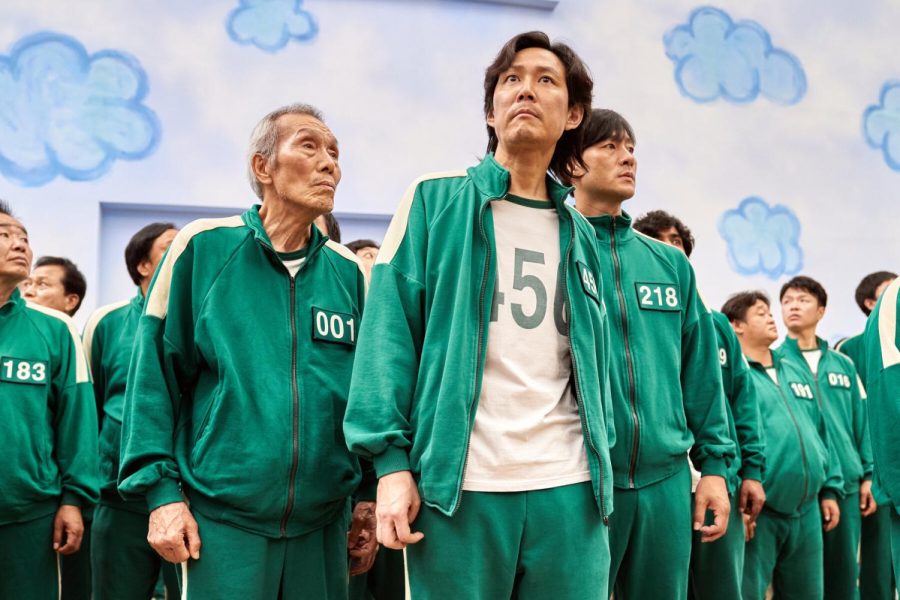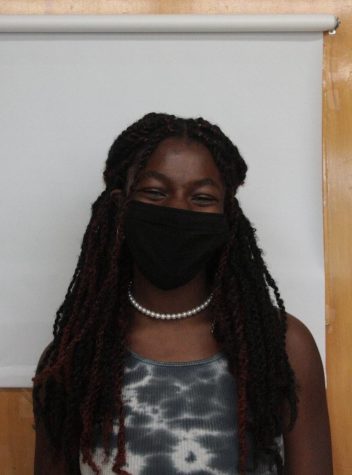Squid Game’s Allure
November 29, 2021
What if I told you that you could win 38 million dollars, just by playing a series of children’s games on a pastel-colored playground? Most people would be more than willing to participate considering the low stakes. The catch? The stakes are anything but low.
Squid Game, a dystopian Korean drama that took Netflix and the U.S. by storm these past couple of months. It popped up on the Netflix platform on Sep 17, 2021, and quickly became an internet sensation across mainstream platforms such as Twitter, Tik Tok, and Instagram.
The characters in the show all have some kind of urgent need for money. They all enter the “Squid Game,” where they participate in a culmination of playground games with a strange and terrifying twist. As the games begin, the characters realize that they have signed up for a very devious scheme, where they either play for money, or play to their deaths.
Nura Salah, a junior at Ida B. Wells-Barnett High School and huge fan of the show, found out about it in a way that most of Gen Z did. “I had heard about it originally on Tik Tok, and then I came to school the next week, and everybody was watching it,” she said.
Salah wasn’t too sure about what she was getting into when she started the show. “At first I was like if everyone’s watching it, I might as well watch it. It might be overhyped,” said Salah, “then I sat down, watched the first episode and was like hold on, this is a very interesting concept.”
Squid Game is known for its commentary on the capitalist lifestyle that we all fall victim to, and how it affects those that fall victim to it. The frightening consequences of each game really emphasized what people are willing to do for money, and a debt-free life, even if winning was at the direct expense of others.
Salah, like many of us, was very shocked by the sudden thriller aspect of the scenes. “They started pulling out guns,” she said.
Squid game is not only a heart-wrenching show with unexpected twists and turns, but the visuals were incredibly eye-catching and well thought out. The gruesome scenes in contrast with the brightly colored children’s play structures, were chillingly captivating. “Something that really resonated with me was the cinematography. It was insane,” said Salah.
Writer, Hwang Dong-hyuk, drew some parallels to former president, Donald Trump, and the VIPs, who are the founders of the Squid Game, in an interview with IndieWire (via English translator). “Donald Trump became the president of the United States and I think he kind of resembles one of the VIPs in the Squid Game. It’s almost like he’s running a game and not a country, like giving people horror,” he said.
Though the show was heavily dramatized, there was a scary reality that a lot of us were forced to face while watching it. “I really like that it was capitalist commentary, I thought that it was uniquely placed,” Salah said.
Though dystopian fiction is not new to American pop culture, something that set Squid Game apart from series’ like The Hunger Games, or Divergent, is the fact that the show is Korean. Not only has Squid Game been deemed Netflix’s most watched Korean Drama, but is also the most watched show in the history of the streaming network.
Korean media has been very successful in the U.S., with Korean pop groups such as BTS, BlackPink, and movies like Parasite taking over. And now, with Squid Game, it’s safe to say that the South Korean media influence is here to stay.
The show essentially exposes an aspect of human life that many of us try to have a hard time grappling with. “In and of itself, it shows what people would be willing to do for money. It is a super relatable concept among people in general,” said Salah.
The show really forces you to look at the global economic struggles where those that do not have the privilege of financial stability, have to put their own lives on the line, in the hopes that chance is on their side.



